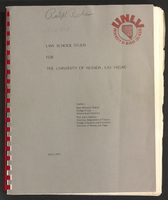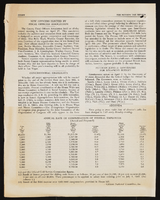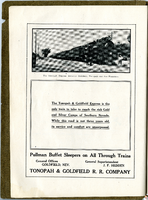Search the Special Collections and Archives Portal
Search Results

Law School Study for the University of Nevada, Las Vegas (final draft)
Date
Archival Collection
Description
A final draft version of the "Law School Study for the University of Nevada, Las Vegas" by Dean Willard H. Pedrick, College of Law, Arizona State University, and Professor Lorne Seidman, Chairman, Department of Finance, College of Business and Economics, University of Nevada, Las Vegas.. From the University of Nevada, Las Vegas William S. Boyd School of Law Records (UA-00048).
Text

Transcript of interview with Cindy Coletti and David Fordham by Stefani Evans and Claytee White, October 27, 2016
Date
Archival Collection
Description
The interior of the green house at the end of the cul-de-sac envelops the visitor. Every room exudes comfort and encourages conversation even as the lake, lapping quietly on three sides of the house, beckons. Cindy Coletti revels in this house and its interiors, all of her own design, especially because they are so different from the daring, opulent, and award-winning custom homes for which she is known. Arriving in Las Vegas in 1988 as a single mother, Cindy immediately submitted a successful design for the first Southern Nevada Street of Dreams event and began networking. She established Sun West Custom Homes in Nevada by applying the design and contracting skills she had successfully honed by building nearly seventy houses in California, Florida, and Colorado—all the while grooming her son Danny—from the time he was in his teens—to eventually take over the company. In this interview, Cindy's husband, David Fordham, shares his background, his reasons for relocating to Las Vegas, work in commercial real estate, meeting Cindy, and living at The Lakes. Cindy then recalls the experiences that brought her to Las Vegas; shaped her ideas of self-help, friendship, design, and business, and instilled in her the confidence to succeed in a man's world. Cindy has retired from building and now enjoys traveling with her husband, but Sun West Custom Homes continues to thrive under the capable ownership and leadership of Daniel S. Coletti.
Text

Transcript of interview with Marla Letizia by Barbara Tabach, August 26, 2015
Date
Archival Collection
Description
In this interview, Letizia discusses her career, and breaking gender barriers in both broadcasting as well as in advertising. She also talks about how her family ended up settling in Las Vegas, and the evolution of her relationship with Judaism from childhood to adulthood, eventually leading to her leadership roles with Congregation Ner Tamid as well as Jewish Federation, where she is on the Board of Directors.
Marla R. Letizia is the founder of Big Traffic Mobile Billboards in Las Vegas, Nevada. The company operates mobile billboard advertising trucks and employs brand ambassadors to carry WOBI? walking billboards for retail, gaming, and entertainment clients such as Caesars entertainment, Tropicana, and Cirque Du Soleil. Letizia founded Big Traffic in 2001 after leaving a successful broadcast journalism career to raise her two children. She met her husband, Tom Letizia, while working at KLAS-TV Channel 8 as an assistant production manager. She later became the first female director of live television news broadcasts in Las Vegas at Channel 8. She also developed a TV show called "Las Vegas Turnaround" and a syndicated production called "The Parenting Network." Letizia grew up in Las Vegas, and is a former president of Congregation Ner Tamid and a founding member of the board of trustees of the Meadows School in Las Vegas. In this interview, Letizia discusses her career, and breaking gender barriers in both broadcasting as well as in advertising. She also talks about how her family ended up settling in Las Vegas, and the evolution of her relationship with Judaism from childhood to adulthood, eventually leading to her leadership roles with Congregation Ner Tamid as well as Jewish Federation, where she is on the Board of Directors.
Text

Transcript of interview with Arne Rosencrantz by Claytee White, February 9, 2010
Date
Archival Collection
Description
In this interview, focused on the John S. Park neighborhood of Las Vegas, Arne Rosencrantz discusses his childhood growing up in Las Vegas. He talks about local businesses, including his father's furniture store, as well as schools and churches in the neighborhood.
Arne Rosencrantz remembers living on Beverly Way from 1954 to 1970. Like so many others from that era, he attended Fifth Street School, John S. Park Elementary School, John C. Fremont Middle School and graduated from Las Vegas High School. As a Jew, he was in a small minority, but fondly recalls growing up in the dense Mormon population of John S. Park Neighborhood. As a youngster, life in Las Vegas was filled with fun. The desert provided opportunity to hunt lizards and rabbits. Kids walked to school without concern. They played ball and found the Strip casinos welcoming to locals. He tells how the social issue of segregation of the 1960s did not affect him personally, but how local movie theatre owner Lloyd Katz fought to make his Huntridge and Fremont theatres integrated. He also reminisces about his father opening Hollywood Furniture and later Garrett's Furniture, which Arne operated until retiring in 2001. During the interview, he lists other furniture companies and the strong assortment of other retailers and restaurants that served the neighborhood.
Text

Transcript of roundtable interview with members of Midbar Kodesh, April 19, 2015
Date
Archival Collection
Description
In this interview, members of Midbar Kodesh discuss how they each became involved in the synagogue, and how the congregation formed in the mid-1990s. Some of the narrators grew up in Las Vegas and talk about the growth of the town and being former members of Temple Beth Sholom.
Text

Transcript of interview with Pauleen Foutz by Don Scott Kaye, February 25, 1980
Date
Archival Collection
Description
Text

Transcript of interview with Gladys Neville by JoAnn Bingham, June 2, 2004
Date
Description
Text



